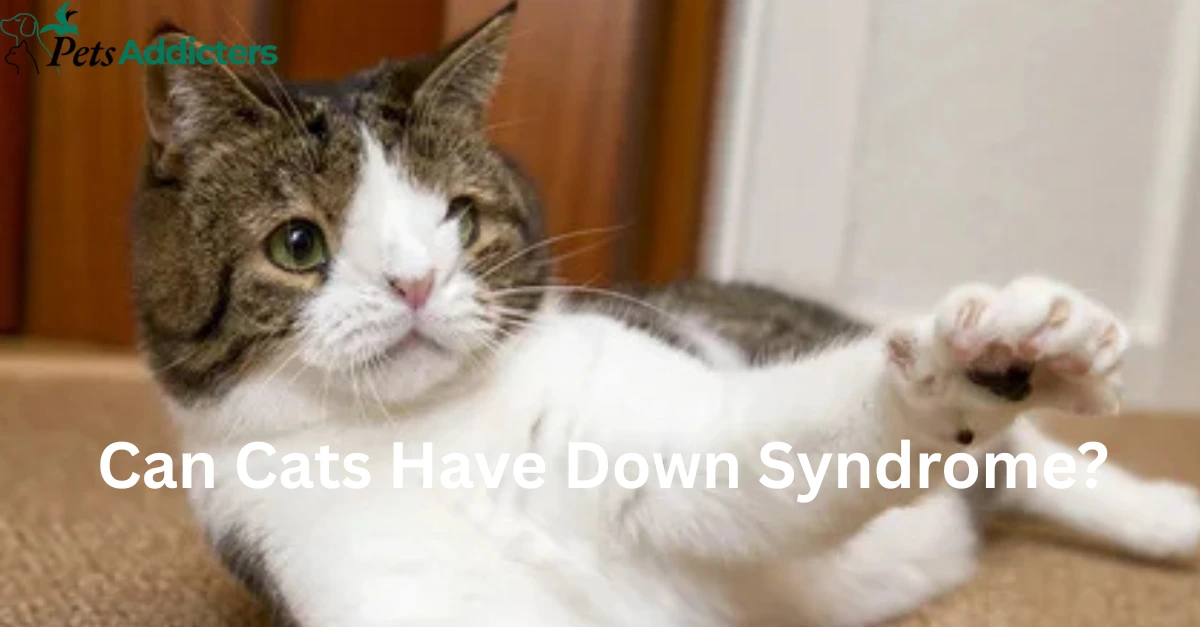You’ve probably watched videos or images of cats with rounded faces, large eyes, or an unsteady gait. You might have asked yourself: can cats have Down Syndrome? That’s a totally logical question. We’re going to explain it simply and tell you what you need to know if your cat looks or acts differently.
Can Cats have Down Syndrome?
In humans, Down Syndrome is caused by an extra chromosome 21. Humans have 23 pairs of chromosomes while cats have 19. Because cats don’t have a chromosome that corresponds to the human chromosome 21, cats can’t get Down Syndrome as humans do. So the simple medical answer is: no cats can’t get Down Syndrome.

What people are describing when they discuss “cats with Down Syndrome”
When people say a cat “has Down Syndrome,” they usually just mean the cat has some facial deformities, lack of coordination, behavioral problems, or a combination of these. Those symptoms can be due to another underlying genetic mutation, congenital defect, brain development issue, or trauma or infection early in life. Reaching out and telling someone a cat “looks like” it has Down Syndrome is shorthand not a diagnosis.
read more: sign your cat is in pain
Common conditions that are similar to Down Syndrome in cats
- Cerebellar hypoplasia: a neurological disorder that causes an unsteady gait and tremor. Cats with this condition are typically very playful and can live entirely normal lives with very few adjustments.
- Congenital facial deformities: birth defects that cause a kitten’s face to be misshapen, resulting in an appearance that some individuals refer to as “different.”
- Neurological infection or injury: trauma or infection during pregnancy may affect coordination and behavior.
- Nutritional or metabolic conditions: infantile or prenatal nutritional deficiency may lead to delayed development.
How to care for a cat with Down Syndrome-like features
- Make the home accessible and safe: place food, water, and litter boxes in a reachable location. Place low-sided litter boxes and non-slip mats under where they walk.
- Prevent hazardous jumping and high areas: place ramps or low steps on beds and favored windows so that your cat does not need to jump.
- Provide soft bedding and hard resting areas: cats with balance dysfunction prefer hard, comfortable areas to rest.
- Visit a vet regularly: vets can rule out treatable causes and help with supportive treatment.
- Offer positive, gentle interaction: short play, puzzle feeders, and slow grooming strengthen trust and keep your cat engaged.
- Diet, supplements, and therapy
Offer a well-balanced, age-appropriate diet. Discuss supplements with your vet ahead of time — most human supplements are toxic to cats. For some conditions, vets may prescribe specific nutritional regimens, physical therapy techniques, or monitoring as opposed to medication.
Mobility aids and home modification
Minor adjustments can make a huge difference: ramps to favorite places, more than one litter box strategically placed in the home, shallow dishes, anti-slip mats reduce the need for risky mobility and stress.
Real-life anecdotes and prognosis
Most owners find that special-needs cats adapt incredibly well. Those with mild effects can have long, healthy lives with minimal alteration. Prognosis varies with underlying condition; with regular vet visits, any issues are identified and addressed early.
Emotional support and enrichment
Normality and stimulation are vital. Scheduled feeding times, gentle play, interactive toys and puzzle feeders avoid boredom and exercise minds without overdoing things.
Myth-busting
- Myth: A Down Syndrome cat is less affectionate. Fact: They are very affectionate and highly attached to caregivers.
- Myth: Special-needs cats need constant medical care. Fact: Most need only slight accommodations and periodic check-ups.
When to call a vet in a hurry
If your cat collapses suddenly, won’t eat, demonstrates extreme lethargy, loses balance rapidly, or indicates distress, give immediate veterinary care. Sudden deterioration must be dealt with immediately.
Adoption and ethics
It may be worth the trouble to adopt a special-needs cat. Shelters typically have special foster networks and resources for special needs animals; ask your local rescue about support and long-term care resources.
FAQs
Can cats have Down Syndrome?
No. Cats can not have Down Syndrome because the chromosomal cause does not exist in felines. However, other medical or genetic conditions can produce similar traits.
Why does my cat look like it has Down Syndrome?
Various genetic or developmental conditions like cerebellar hypoplasia, congenital deformities, or prenatal infections can cause similar signs. A vet exam will clarify the cause

